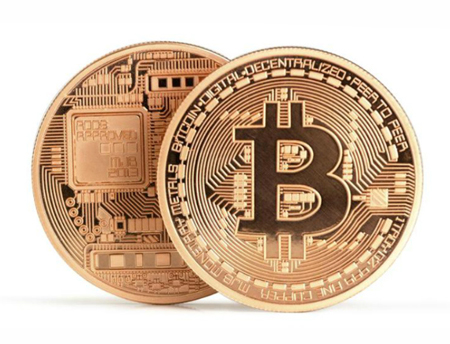On Dec. 10, bitcoin futures trading began on the Cboe Futures Exchange. The initial surge of activity was so overwhelming that the Cboe temporarily went down. The following day, bitcoin futures opened at $15,000 and closed at $18,545, a 23.6 percent spike.
 For Christopher Salem, a Danbury-based business and personal development consultant, the Cboe launch of bitcoin trading was a missed opportunity. “I”™m usually ahead of the curve on a lot of investments before the general population catches up, but not on this one,” he said. “It has been around for eight years and when it began there were very few people, who were mining it for pennies.”
For Christopher Salem, a Danbury-based business and personal development consultant, the Cboe launch of bitcoin trading was a missed opportunity. “I”™m usually ahead of the curve on a lot of investments before the general population catches up, but not on this one,” he said. “It has been around for eight years and when it began there were very few people, who were mining it for pennies.”
For Eric Meermann, vice president of Palisades Hudson Financial Group in Stamford, bitcoin spells nothing but trouble. “I don”™t think it has any place in an individual investor”™s portfolio,” he said. “This is the biggest bubble I”™ve seen in my 17 years as a financial adviser and it is the biggest bubble that we”™ve seen since the Dutch tulip bubble of 1637.”
Others in the business community are confused by or just not interested in the trading phenomenon. “For the life of me, I cannot wrap my head around bitcoin,” said Brent Nyitray, director of capital markets at iServe Residential Lending in Stamford.
“I am clueless on bitcoins,” said Mickey Herbert, president and CEO of the Bridgeport Regional Business Council. “The issue has yet to be brought to my attention by any of our 750 BRBC members.”
The concept of bitcoin as a cryptocurrency was introduced in November 2008 in a paper titled, “Bitcoin: A Peer-to-Peer Electronic Cash System,” that was distributed to a mailing list of cryptography experts. Neil Howe, head of the demography sector at Hedgeye Risk Management in Stamford, noted that there was something unusual about the person credited with inventing the bitcoin concept.
“The guy who founded it is Satoshi Nakamoto,” Howe said. “No one knows who he is. He may not exist at all.”
Bitcoin production is done in a process called “mining,” which uses special software to solve computationally challenging puzzles. Bitcoin units are mined in blocks and anyone can participate in building the bitcoin block chain. Howe said that Nakamoto”™s plans set a specific parameter for bitcoin production, but that is in danger of disappearing.
“In the original algorithm, it would never be over 21 million” bitcoin units, he said. “Now, there are 16 million to 17 million out there, with more being distributed or mined. This is something of a nutty area, where a group of miners can branch off a chain and start a new series of blocks. The currency could split, and that is called a fork. You can have either a hard fork or a soft fork.”
“It is complex,” Howe said. “You don”™t know if bitcoin splits and dilutes the value.”
Federal and state regulatory oversight on bitcoin has been hampered by the decentralized and global nature of the cryptocurrency. In July, the first federal regulatory oversight of a bitcoin-specific entity occurred when the U.S. Commodity Futures Trading Commission granted LedgerX, a cryptocurrency trading platform operator, approval to become a regulated digital currency options exchange and clearinghouse.
Four months earlier, however, the federal government rejected an effort by sibling investors Cameron and Tyler Winklevoss to register a bitcoin-based, exchange-traded fund called Winklevoss Bitcoin Trust.
On Dec. 11, Securities and Exchange Commission Chairman Jay Clayton issued a warning about cryptocurrency investing, noting that “significant trading may occur on systems and platforms outside the United States” and invested funds could “quickly travel overseas without your knowledge,” resulting in greater risks and little chance for funds recovery by U.S. regulators if investments sour.
Ray Manganelli, executive dean at Mercy College School of Business, questioned the economic concept of trading in bitcoin futures.
“It has no fundamental basis of value,” he said. “Any time you look at the value of a commodity such as gold or silver, there is an understood underlying value of its worth. With bitcoin, it is impossible to value. You”™re making a bet, but there doesn”™t appear to be a specific point of value around where the bet is being made.”
“Bitcoin is only worth what someone else is paying for it,” said Meermann at Palisades Hudson. “A currency has to hold value, but in bitcoin the process is defined by speculators trading. It is not a currency, it is a speculative investment.”
Some finance professionals, however, think bitcoin deserves to be considered as a potential investment.
“This is for someone with a higher risk tolerance and longer time horizon to consider as a smaller percentage of their portfolio,” said Maxwell Loeb, financial planner at Westchester Benefit Group Inc. in Valhalla.
“There is a fear of missing the boat,” Loeb said of the recent attention given the cryptocurrency and activity by investors with the launch of bitcoin futures trading. “There is a tremendous amount of risk and, potentially, a tremendous amount of reward. Or it could drop back to $5,000 or lower.”
Loeb warned that bitcoin is too volatile for investors trying build retirement savings or help their children accrue money for college. While he has fielded some questions from clients on bitcoin investment, “I”™ve not recommended it for a single client,” he said.
Several major e-commerce sites, including Overstock.com and Microsoft, accept bitcoin payment in transactions. But Howe noted that comes with a catch.
“Some e-tail stores claim they accept it, but they don”™t accept it,” he said. “They have a contract with bitcoin exchange companies that take bitcoin off the web and exchange it into dollars.”
“There are problems with large bitcoin transactions because they can create extra volatility,” said Howe. “And it”™s not very good for scaling to small expenses. If more people are doing transactions, it becomes more and more expensive. As of a couple of days ago, it cost $5 to $6 per transaction” for the consumer.
In this region, four Fairfield County businesses and four Westchester County businesses accept bitcoin payments, according to CoinMap, a website that tracks venues that accept bitcoin both locally and worldwide. The Bumper Ball USA franchise network, which operates in both counties, is also listed on CoinMap as taking bitcoin in lieu of dollars.
At PC-Perfect New York, a computer repair shop in Yonkers, owner Louis Bosques said he began taking bitcoin payments two years ago as “my way of keeping up with the times.” Apparently, however, the times have not yet caught up to Bosques.
“We had one bitcoin payment and that was made last year,” he said. “It is not a very popular payment yet. People either don”™t know how bitcoin works or they aren”™t familiar with it.”
At iServe Residential Lending, Nyitray wondered how it would be possible to use bitcoin for real estate transactions.
“I guess it is no different than any other asset, although given the volatility of it, I would be surprised if either buyer or seller would be comfortable dealing with a house price quoted in bitcoin,” he said. “Plus, the financing has to be in dollars, as no banks lend in bitcoin — at least none that I am aware of.”
James R. Reynolds, portfolio manager at Ganim Financial in Bridgeport, predicted that bitcoin’s viability for consumer transactions will be diminished over time. “Services such as Steam, an online gaming portal, have stopped accepting bitcoin due to its price volatility,” he said. “In theory it is a great store of value, but the current market mechanics make it unrealistic as a currency for transactions. It takes too much time and energy ”” actual electrical energy to power computers ”” for someone to transact in bitcoin. Add in a layer of transaction fees and this combination makes it extremely unlikely for any store owner to accept bitcoin.”
At Hedgeye Risk Management, Howe said bitcoin is the go-to currency for those who prefer to keep their business operations in the shadows.
“There is only one kind of transaction where bitcoin has a huge advantage and that is a criminal transaction,” he said, noting how governments, including North Korea and Iran allegedly used bitcoin payments to circumvent international sanctions on direct financial transactions.
Closer to home, bitcoin was the payment preference in a recent email shakedown aimed at New Canaan and Darien residents who received messages threatening to spill secrets on them unless $3,500 in bitcoin payments were made to the anonymous senders.























This article is hilarious!
Meerman calls it an investment.
Bitcoin is NOT an investment. He clearly doesn’t understand what it is.
Also, “It is complex,†Howe said. “You don’t know if bitcoin splits and dilutes the value.†is funny. Yes, we do know that it does not dilute the value.
Then there is this…. Ray Manganelli, executive dean at Mercy College School of Business, questioned the economic concept of trading in bitcoin futures.
“It has no fundamental basis of value,†he said. “Any time you look at the value of a commodity such as gold or silver, there is an understood underlying value of its worth. With bitcoin, it is impossible to value. You’re making a bet, but there doesn’t appear to be a specific point of value around where the bet is being made.â€
uh, you mean like the US Dollar, Ray?
“A currency has to hold value, but in bitcoin the process is defined by speculators trading.
Uh, do you mean like the US Dollar Erik?
“There is a fear of missing the boat,†<—- finally, someone has a decent comment in this article.